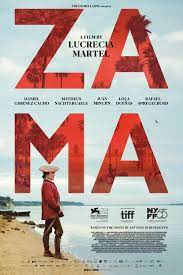
ZAMA
Argentina, 2017, 115 minutes, Colour.
Daniel Gimenez Cacho, Lola Duenas, Matheus Nachtergaele, Juan Minujin, Nahuel Cano, Marianna Nunes, Carlos Defeo.
Directed by Lucrecia Martel.
Zama is the name of a colonial magistrate in Argentina at the end of the 16th century. He is isolated from his wife and children, wanting a transfer having been stranded in the outpost for a long time. He is a stern man, generally not smiling, attracted by the wife of an official, fathering a child by some of the servants, in conflict with other officials, especially the Gov, pleading for official letters to the King of Spain for his transfer.
The film is based on a 1956 novel by Antonio de Benedetto and adapted for the screen by prominent Argentinian writer-director, Lucrecia Martel. She has built up a strong reputation over the decades – and this film is considered one of the top films of the Argentinian film industry.
The film will have greater impact for Latin American countries with their experience of colonialism, oppreion of indigenous peoples, European arrogance.
The pace of the film is rather slow for those who seek action. Rather, the audience is immersed in the pace of life in this colony, slow, restricted, unimaginative – although one young official is writing a book to displeasure of the governor. There are hankerings for visits to he capitol for the theatre.
Daniel Gimenez Cacho is a strong silent presence as Zama – until, finally frustrated, he leads an expedition to hunt down an alleged robber and rapist with a vicious reputation, but falling foul of the indigenous people, of the alleged perpetrator, he is rescued by a young boy, his hands cut off, in a canoe sailing off to…?
- The title, the focus on Zama himself, as a man, married, father, isolated, with responsibilities, wanting a transfer?
- The period, the late 16th century, Argentina, the Spanish colonies, the isolated towns, buildings, streets, church, administration? Costumes and decor? The musical score – and 20th century Hispanic melodies?
- The situation in the colony, administrators, subservient to the King of Spain, the local governors, magistrates, clergy, bureaucracy? Wives? Servants and slaves? The indigenous, local wear and Hispanic coats…?
- The audience observing Zama, on the beach, watching the women, official meetings, his wig, in the house, the three women and his attentions, the attraction to the wife, the encounters with her, propriety, temptation to break propriety, listening to her? His secretaries and their work? The official writing the book? The departing governor, not giving the transfer, taking his furniture…? The new governor, the appeal, the Governor wanting a report on the writer of the book, his writing the report, the delay with the letters to the king? His frustrations?
- The Oriental, the brandy, his arrival, the mystic boy on the chair and his utterances about Zama? The meeting with the wife and the Oriental, the cholera, his manners, collapse, his death? The priests, the arrangement for the funeral, the body, the lime to preserve it? The issue of fees, the brandy?
- Zama, longing for his wife, his liaisons, being a father? Wanting letters? Questioning visitors?
- The ultimate frustration, growing his beard, volunteering for the expedition, the gossip about the rapist, his being allegedly dead? The group, the indigenous, the emergence of the criminal group, the leader, painted red, the taunts, accusations that Zama was a traitor, the fighting, the betrayal, the taunts from the leader, living on falls reputation, the group and the desire for wealth, the stones? The cutting off of Zama’s hands, drifting to?